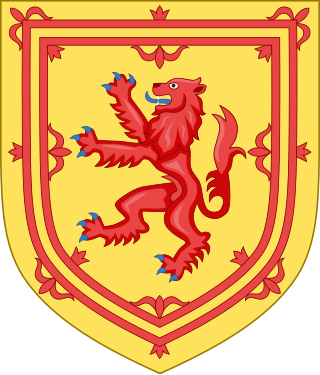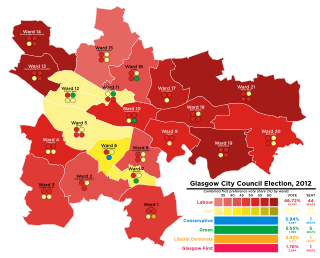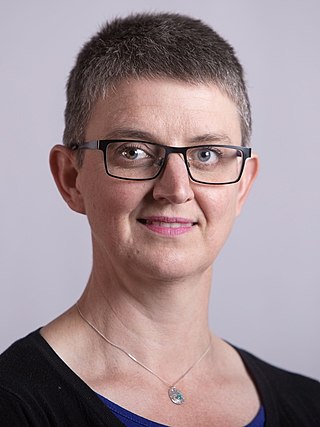
Aberdeen City Council is the local government authority for the city of Aberdeen, Scotland. It was created in 1996, under the Local Government etc. (Scotland) Act 1994, though a sense of Aberdeen as a city, with its own city council, can be traced back to 1900, when the county of the city of Aberdeen was created.
The politics of Edinburgh are expressed in the deliberations and decisions of the City of Edinburgh Council, in elections to the council, the Scottish Parliament and the UK Parliament.

Glasgow City Council is the local government authority for Glasgow City council area, Scotland. In its modern form it was created in 1996. Glasgow was formerly governed by a corporation, also known as the town council, from the granting of its first burgh charter in the 1170s until 1975. From 1975 until 1996 the city was governed by City of Glasgow District Council, a lower-tier authority within the Strathclyde region.

The Scottish Labour Party (SLP) was a socialist party in Scotland that was active between 1976 and 1981. It formed as a breakaway from the UK Labour Party. It won three council seats in 1977 but lost its MPs at the 1979 election and was dissolved two years later.
Winifred Margaret Ewing was a Scottish politician, lawyer and figure within the independence movement who served as President of the Scottish National Party from 1987 to 2005. Ewing was a Member of the Scottish Parliament (MSP) for Highlands and Islands from 1999 to 2003 and a Member of the European Parliament (MEP) for the equivalent seat from 1979 to 1999. She was also a member of the British House of Commons for Hamilton from a 1967 by-election until 1970, and for Moray and Nairn from 1974 to 1979.

Local government in Scotland comprises thirty-two local authorities, commonly referred to as councils. Each council provides public services, including education, social care, waste management, libraries and planning. Councils receive the majority of their funding from the Scottish Government, but operate independently and are accountable to their local electorates. Councils raise additional income via the Council Tax, a locally variable domestic property tax, and Business rates, a non-domestic property tax.
The Politics of Aberdeen, Scotland have changed significantly in recent years. In 1996, under the Local Government etc. (Scotland) Act 1994, Grampian Regional Council and Aberdeen District Council were dissolved, creating the new unitary Aberdeen City Council to represent the city's council area.

Local elections were held in Scotland on 6 May 1999, the same day as First Scottish Parliament elections. It was the second election for all 32 Scottish councils and the first after a major review into all wards.

Elections to Glasgow City Council were held on 3 May 2012, the same day as the other Scottish local government elections. The election was the second using 21 new wards created as a result of the Local Governance (Scotland) Act 2004, each ward elected three or four councillors using the single transferable vote system form of proportional representation.
The politics of Glasgow, Scotland's largest city by population, are expressed in the deliberations and decisions of Glasgow City Council, in elections to the council, the Scottish Parliament and the UK Parliament.

Maggie Chapman is a Scottish politician and lecturer who is a Scottish Green Member of the Scottish Parliament (MSP) for North East Scotland. She was co-convenor of the Scottish Greens from November 2013 to August 2019, serving with Patrick Harvie, and was the party's lead candidate for the 2019 European election.

An Election to the Edinburgh Corporation was held on 7 May 1968, alongside municipal elections across Scotland. Of the councils 69 seats, 22 were up for election. Despite receiving the most votes of any single party, the SNP won only 7 seats. Unlike in Glasgow, the Progressives and Conservatives did not run on a joint ticket. Despite that however the parties only ran competing candidates in the Gorgie-Dalry ward.

The Glasgow City Council election of 2017 was held on 4 May 2017, the same day as the 31 other Scottish local government elections. The election was the first to use 23 new wards, created as a result of the Local Government Boundary Commission for Scotland's 5th Review. Each ward elected three or four councillors using the single transferable vote system, a form of proportional representation used since the 2007 election and according to the Local Governance (Scotland) Act 2004.

Elections to Edinburgh Corporation were held on 2 May 1961, alongside municipal elections across Scotland. Of the councils 69 seats, 23 were up for election. However, only 16 seats were contested, as councillors were returned unopposed in seven wards.

An election to the Aberdeen Corporation was held on 1 May 1973, alongside municipal elections across Scotland. 12 of the corporation's 36 seats were up for election.

Elections to Glasgow City Council took place on 5 May 2022 on the same day as the 31 other Scottish local government elections. As with other Scottish council elections, it was held using single transferable vote (STV) – a form of proportional representation – in which multiple candidates are elected in each ward and voters rank candidates in order of preference.

Elections to Aberdeen City Council took place on 5 May 2022 on the same day as the 31 other Scottish local government elections. As with other Scottish council elections, it was held using single transferable vote (STV) – a form of proportional representation – in which multiple candidates are elected in each ward and voters rank candidates in order of preference.

An election to the Aberdeen Corporation was held on 3 May 1949, alongside municipal elections across Scotland. 12 of the corporation's 37 seats were up for election.

An election to the Aberdeen Corporation was held on 2 May 1950, alongside municipal elections across Scotland. 12 of the corporation's 37 seats were up for election.

An election to the Aberdeen Corporation was held on 1 May 1952, alongside municipal elections across Scotland. 14 of the corporation's 37 seats were up for election.















